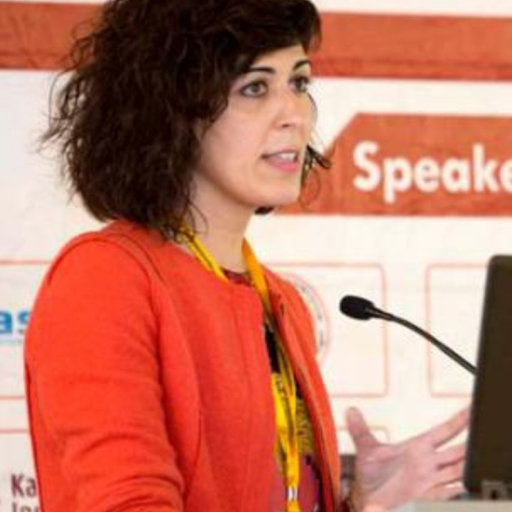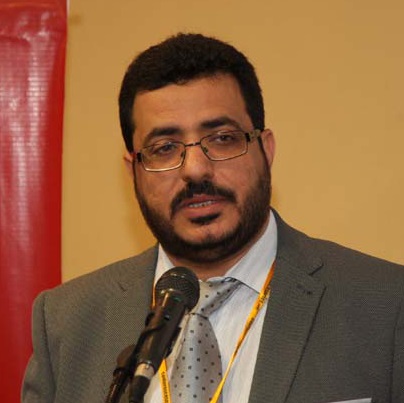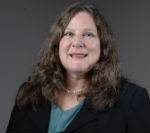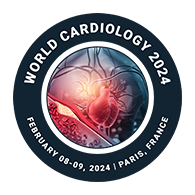Renowned Speakers

Elisabet Berastegui
Hospital Universitari Germans Trias i Pujol, Spain

John M. Flack
Southern Illinois University School of Medicine, USA

Cristina Florescu
Craiova University of Medicine and Pharmacy, Romania

Mary Niu
University of Oklahoma, USA

Hamid Amer
King Abdulaziz Hospital – NGHA, Saudi Arabia

Ashok Tahilyani
Our Lady of Lourdes Hospital Ireland, Ireland

Our Lady of Lourdes Hospital Ireland
Zulekha Hospitals, UAE

M. Eileen Walsh
College of Nursing at the University of Toledo, USA
Recommended Global Cardiology Webinars & Conferences
Europe & UK
Asia Pacific & Middle East
Canada
WORLD CARDIOLOGY 2024
welcome message
Welcome to the esteemed 3rd International Conference on Cardiology, a pivotal gathering poised to illuminate the latest advancements in cardiovascular research and practice. Set against the backdrop of London, UK, on October 17-18, 2024, World Cardiology 2024 promises to be a nexus of innovation, collaboration, and expertise.
Distinguished delegates, esteemed speakers, and esteemed guests, your presence fuels the momentum of progress in the realm of cardiology. Together, let us delve into cutting-edge discoveries, engage in insightful discussions, and forge enduring connections that will shape the future of cardiovascular health.
As we convene in this vibrant metropolis, let us harness our collective knowledge and passion to confront the challenges ahead, driving towards a world where heart health knows no bounds. Welcome to World Cardiology 2024, where the heartbeat of innovation resonates, and the pulse of progress beats strong.
Market Analysis
The 3rd International Conference on Cardiology is poised to provide insights into the dynamic market trends shaping the field. With a focus on "Advancing Cardiology and Exploring the Future of Heart Health," the conference is expected to shed light on the increasing demand for cardiovascular solutions driven by the rising prevalence of heart diseases worldwide. Technological innovations, particularly in diagnostic tools and treatment modalities, are reshaping the landscape of cardiology, while the emergence of personalized medicine is driving a shift towards tailored interventions based on individual patient factors. Telemedicine and remote monitoring technologies are gaining prominence, offering opportunities to improve access to care and patient outcomes. Additionally, collaborations and partnerships within the industry are fostering innovation and market expansion globally. Understanding and navigating regulatory considerations remain crucial for market access and commercial success in the evolving cardiology market landscape.
Moreover, the market is witnessing a notable trend towards personalized medicine, where treatments are tailored to individual patient profiles, encompassing genetic predispositions, lifestyle factors, and medical histories. This personalized approach not only enhances treatment efficacy but also underscores the growing importance of precision medicine in addressing the diverse needs of patients with cardiovascular conditions.
About Conference
The 3rd International Conference on Cardiology is a premier event dedicated to advancing the field of cardiovascular medicine and science. Held in the dynamic city of London, UK, on October 17-18, 2024, this conference is a cornerstone of the World Cardiology 2024 series.
At this ground breaking gathering, leading cardiologists, researchers, clinicians, and industry professionals from around the globe converge to share insights, exchange knowledge, and collaborate on the latest developments in cardiology. From ground breaking research presentations to interactive workshops and panel discussions, the conference offers a multifaceted platform for exploring the most pressing issues facing cardiovascular health today.
World Cardiology 2024 promises to be a transformative experience, uniting the brightest minds in cardiology to collectively tackle the challenges and opportunities that lie ahead. Join us in London as we embark on a journey towards a healthier, more resilient future for heart health worldwide
Conference highlights include:
- 100+ participants (Both Industry and academia)
- 11+Keynote speakers
- 30+ Plenary speakers
- 10+ Exhibitors
- Innovative educational sessions
- B2B meetings
- Hands-on Workshop
Why to attend conference:
1. Cutting-Edge Insights: Gain access to the latest research findings, advancements, and breakthroughs in the field of cardiology. Stay ahead of the curve by learning from leading experts and innovators.
2. Networking Opportunities: Connect with a diverse community of cardiologists, researchers, clinicians, and industry professionals from around the world. Forge valuable collaborations, exchange ideas, and expand your professional network.
3. Professional Development: Enhance your knowledge and skills through engaging workshops, interactive sessions, and hands-on demonstrations. Acquire practical tools and strategies to improve patient care and outcomes in your practice.
4. Multidisciplinary Approach: Explore cardiology from various perspectives, including preventive cardiology, interventional cardiology, electrophysiology, imaging, and more. Gain insights from experts across different specialties and disciplines.
5. Stay Updated: Stay abreast of the latest guidelines, protocols, and best practices in cardiovascular medicine. Learn how to integrate evidence-based strategies into your clinical practice to optimize patient care.
Target Audience:
- Cardiologists
- Scientists
- Physicians/Consultants/ General Practitioners
- Directors/Managers
- Pathologists/ Nurses
- Presidents & Vice Presidents/ Directors / Administrators
- Business Entrepreneurs
- Cardiology Associations/ Societies
- Training Institutes
- Young Researchers
- Medical Students
- Residents
- Medical Devices Companies
- Acadamic Scientists
- Research Scholars
- Business Delegates
- Sonographers
- Pharmacologists
Sessions & Tracks
Track 01: Clinical Cardiology
Clinical cardiology focuses on the diagnosis and management of cardiovascular diseases in adults. It involves evaluating patients' symptoms, performing diagnostic tests (such as ECG, echocardiography, and stress tests), and implementing treatment plans tailored to each individual's condition. management guidelines for common cardiovascular conditions (such as coronary artery disease, heart failure, valvular heart disease), lifestyle interventions, patient education, and shared decision-making.
Track 02: Pediatric cardiology
Experts in diagnosing and treating cardiac problems in children are paediatric cardiologists. For kids who could need heart surgery, paediatric cardiologists and paediatric cardiac surgeons work closely together to determine the best course of action. A range of heart problems can affect children. Certain structural differences are inherited. Some are related to the electrical circuitry that controls pulse frequency.
Track 03: Pediatric heart transplant
Heart transplantation for infants and children is becoming a more common kind of treatment. According to the International Society for Heart and Lung Transplantation registry, between 600 and 700 child heart transplant procedures are performed annually globally, making up around 12% of all heart transplants. In older children, cardiomyopathy is the most common reason for heart transplantation. An increasing proportion of children with congenital heart disease receive palliative surgery, only to have their cardiac function deteriorate over time.
Track 04: Hypertension
The disorder known as high blood pressure affects the arteries in the body. Also referred to as hypertension. If your blood pressure is excessive, the blood's continuous force on the arterial walls is too great. The heart has to work harder to pump blood. Blood pressure is measured in millimetres of mercury, or mm Hg. High blood pressure is often defined as a measurement of 130/80 mm Hg or higher.
Track 05: Cardiovascular diseases
Conditions affecting the heart or blood vessels are collectively referred to as "cardiovascular disease" (CVD). Atherosclerosis and the buildup of fatty deposits inside arteries, which cause them to stiffen and narrow (thrombosis), can result in reduced blood flow to the body, brain, or heart. Children and teenagers are susceptible to certain types of heart disease called cardiovascular disorders. Rheumatic cardiac diseases are thought to be brought on by an autoimmune response.
Track 06: Nuclear Cardiology
Nuclear cardiology studies use noninvasive techniques to detect myocardial blood flow, evaluate the heart's pumping capacity, and pinpoint the site and severity of a heart attack. The most often used nuclear cardiology technique is cardiac perfusion imaging. To evaluate blood flow to the heart muscle, myocardial perfusion images are combined with exercise. There are two ways to exercise: using a stationary bike or a treadmil.
Track 07: Cardiology and Covid 19
Early reports from Wuhan, China on the epidemiology of COVID-19 warned of serious complications that would likely occur in elderly patients and those with pre-existing cardiovascular disease, including acute respiratory distress syndrome, cardiogenic shock, thromboembolic events, and death. Consequently, several reports from all around the world, including US and European investigations, have confirmed similar conclusions.
Track 08: Cardiac Pharmacology
The field of cardiovascular pharmacology includes the classes of medications used to treat and manage cardiovascular diseases include hypertension, heart failure, angina, and arrhythmias. One of the most significant public health issues and a significant financial burden on Western healthcare systems is cardiovascular disease. The functionality and quality of life of those who are impacted by them might be seriously compromised by their associated morbidity.
Track 09: Prenatal Cardiology
Because the foetus does not use its own lungs until delivery, its circulatory system is different from that of a new born baby. The growing infant inside the uterus (womb) of the mother is referred to as a foetus. The placenta is a special organ that provides all of the nourishment a developing baby needs. One side of the placenta is attached to the uterus, and the other side is attached to the sac filled with liquid that contains the foetus. The umbilical cord is a special chord that connects the placenta and the growing foetus.
Track 10: Cardiac Electrophysiology
An electrophysiology (EP) inquiry, also referred to as an invasive cardiac electrophysiology study, is a series of tests that examine the electrical activity of the heart. The heart's electrical activity produces impulses, or signals, that control how frequently the heart beats. During an EP study, cardiologists can create an extremely accurate map of the signals that go between each heartbeat.
Track 11: Women’s Cardiology
The internal appearance of a healthy heart is nearly identical. For women, this means that your heart health is unique. Women are particularly vulnerable to a range of heart-related issues because of the minute anatomical differences in their hearts. Heart disease is the top cause of death for women in the United States. It's important to be aware of your risk factors and to see a doctor if you feel concerned.
Track 12: Cardiomyopathy and Stroke
Hypertrophic cardiomyopathy (HCM) is most likely to develop in patients with ischemic stroke (IS), mortality, cardiovascular death, all strokes, and major cardiovascular events, such as ventricular arrhythmias leading to cardiac arrest and rehospitalization for heart failure.
• Risk stratification needs to be enhanced, particularly by utilising user-friendly techniques, in order to assist in identifying those HCM at higher risk of IS.
• Using a complex weighted score that considers variables like age, the presence of AF, the age at which AF first manifested, prior thromboembolism, New York Heart Association class, left atrial size, mean wall thickness, and vascular disease, the HCM Risk-CVA (cerebrovascular accident) score can be used to predict IS.
Track 13: Cardiovascular Imaging and Image Analysis
Using medical images, cardiovascular imaging is a diagnostic radiography technique used to diagnose circulatory problems and identify anomalies in the heart. Numerous diseases can be identified with it, such as: • Cardiovascular disease.
• Heart failure or valve problems.
• A cardiac attack resulting in damage.
• Hereditary heart disorders
• Thyroid disease; • Heart tumours.
Track 14: Heart Transplantation
During a heart transplant process, a healthy donor heart is used to replace a failing heart. Those whose symptoms have not improved enough with medication or other surgeries are usually in need of a heart transplant. Even though a heart transplant is a major operation, with the correct aftercare, your chances of survival are high.
- Cardiomyopathy, or weakening of the heart muscle;
- Cardiovascular disease
- Heart valve problems
Track 15: Pregnancy-related heart conditions
There may be challenges unique to cardiovascular illness during pregnancy. Increased blood volume and heart rate, in addition to other pregnancy-related changes, can put extra strain on the heart, aggravating pre-existing conditions and causing new cardiovascular issues. We provide highly skilled treatment for women with cardiovascular illness before, during, and after pregnancy as part of Brigham and Women's Hospital's (BWH) Cardiovascular Illness and Pregnancy programme.
Track 16: Cardiovascular Imaging Advance
Recent developments in cardiovascular imaging methods and technology are examined in this topic. Artificial intelligence applications for image analysis, contrast-enhanced imaging, 3D reconstruction, and high-resolution imaging are among the innovations. In cardiology, these developments improve diagnostic precision and enable individualised therapy planning.
Track 17: Heart failure management
The goal of heart failure management is to enhance the prognosis, quality of life, and symptoms of those who suffer from this illness. It includes a range of tactics, such as dietary changes, prescription drugs, and even surgical procedures.
- ACE inhibitors and diuretics
-
BETA-blockers
Track 18: Innovations in Cardiac Surgery
Innovations in cardiac surgery have led to the development of minimally invasive procedures, which involve smaller incisions and less tissue damage compared to traditional open-heart surgery. These techniques can result in faster recovery times, reduced pain, and lower risk of complications for patients.
- Robotic-Assisted Surgery
- Tissue Engineering and Regenerative Medicine
- Hybrid Procedures
Benefits of Participation
Type of participation:
3rd International Conference on Cardiology 2024, provides the participants with different modes or ways to participate under either Academic / Student / Business Category.
- Keynote speaker: 45-50 minutes
- Speaker (oral presentation): 25-30 minutes (only one person can present)
- Speaker (workshop): 45-50 minutes (more than 1 can present)
- Speaker (special session): 45-50 minutes (more than 1 can present)
- Speaker (symposium): more than 45 minutes (more than 1 can present)
- Delegate (only registration): will have access to all the sessions with all the benefits of registration
- Poster presenter: can present a poster and enjoy the benefits of delegate
- Remote attendance: can participate via virtual mode or video presentation or e-poster presentation
- Exhibitor: can exhibit his/her/their company’s products by booking exhibitor booths of different sizes
- Media Partner
- Sponsor
- Collaborator
For Delegates:
1.Access to Cutting-Edge Research: Delegates gain access to the latest advancements and research findings in the field of cardiology, providing insights into emerging trends, technologies, and treatment modalities.
2.Networking Opportunities: The conference serves as a platform for delegates to network with leading experts, researchers, and practitioners in cardiology, fostering collaborations and partnerships that can drive professional growth and development.
3.Continuing Education: Attending the conference allows delegates to earn continuing education credits and stay abreast of developments in cardiology, enhancing their knowledge and expertise in the field.
4. Exposure to Industry Insights: Delegates have the opportunity to gain insights into industry best practices, regulatory updates, and market trends, enabling them to make informed decisions in their professional roles.
5. Presentation Opportunities: Delegates may have the chance to present their research findings, case studies, or innovative solutions, gaining recognition and feedback from peers and experts in the field.
For Speakers:
1.Visibility and Thought Leadership: Speaking at the conference elevates speakers' visibility and establishes them as thought leaders in the field of cardiology, enhancing their professional reputation and credibility.
2.Knowledge Sharing: Speakers have the opportunity to share their expertise, research findings, and insights with a diverse audience of peers, researchers, and industry professionals, contributing to the advancement of knowledge in cardiology.
3.Networking and Collaboration: Speaking engagements offer speakers valuable networking opportunities, allowing them to connect with fellow experts and potential collaborators, fostering partnerships and collaborations for future research or projects.
4. Professional Development: Presenting at the conference provides speakers with a platform to refine their presentation and communication skills, enhancing their professional development and confidence in public speaking.
5.Publication Opportunities: Some conferences offer speakers the chance to have their presentations or research papers published in conference proceedings or peer-reviewed journals, increasing the visibility and impact of their work.
For Attendees:
1.Learning Opportunities: Attendees have access to a wide range of educational sessions, keynote presentations, and workshops, providing valuable insights into the latest developments and best practices in cardiology.
2.Interaction with Experts: Attendees can interact with renowned experts and thought leaders in cardiology, gaining firsthand knowledge and expertise from their experiences and insights.
3.Networking and Collaboration: The conference facilitates networking opportunities among attendees, enabling them to connect with peers, researchers, and industry professionals from around the world, fostering collaborations and partnerships.
4.Access to Resources: Attendees may gain access to resources such as research posters, exhibitor booths, and educational materials, providing valuable information and resources to support their professional endeavors in cardiology.
5.Professional Recognition: Attendance at a prestigious international conference in cardiology enhances attendees' professional credibility and recognition within their respective fields, demonstrating their commitment to ongoing learning and professional development.
To Collaborate Scientific Professionals around the World
Conference Date October 17-18, 2024
For Sponsors & Exhibitors
Speaker Opportunity
Useful Links
Past Conference Report
Supported By
All accepted abstracts will be published in respective Conference Series International Journals.
Abstracts will be provided with Digital Object Identifier by




